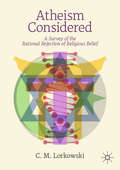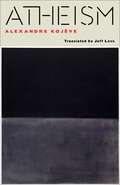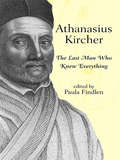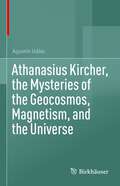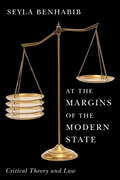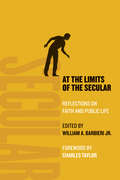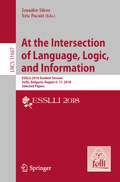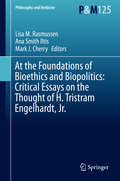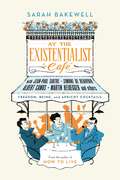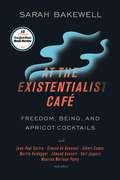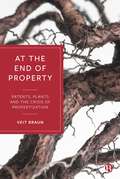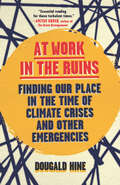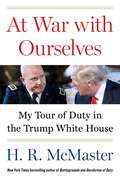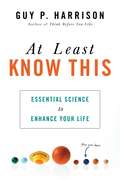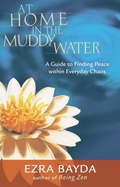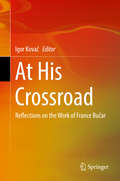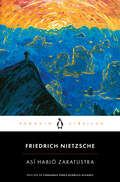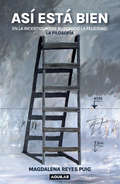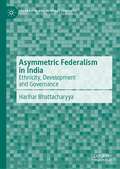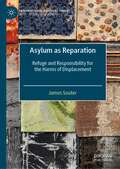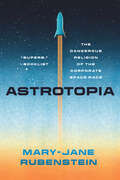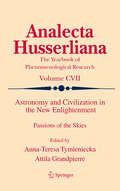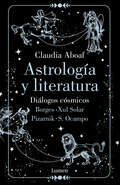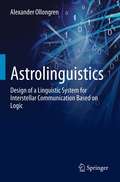- Table View
- List View
Atheism Considered: A Survey of the Rational Rejection of Religious Belief
by C.M. LorkowskiAtheism Considered is a systematic presentation of challenges to the existence of a higher power. Rather than engage in polemic against a religious worldview, C.M. Lorkowski charitably refutes the classical arguments for the existence of god, pointing out flaws in their underlying reasoning and highlighting difficulties inherent to revealed sources. In place of a theistic worldview, he argues for adopting a naturalistic one, highlighting naturalism’s capacity to explain world phenomena and contribute to the sciences. Lorkowski demonstrates that replacing theism with naturalism, contra popular assumptions, sacrifices nothing in terms of ethics or meaning. Instead, morality ultimately proves more important than religion and does not rely on it. Appropriate for classroom use, this book is meant to cultivate understanding, tolerance, and fruitful dialogue between believers and nonbelievers.
Atheism
by Alexandre KojèveOne of the twentieth century’s most brilliant and unconventional thinkers, Alexandre Kojève was a Russian émigré to France whose lectures on Hegel in the 1930s galvanized a generation of French intellectuals. Although Kojève wrote a great deal, he published very little in his lifetime, and so the ongoing rediscovery of his work continues to present new challenges to philosophy and political theory. Written in 1931 but left unfinished, Atheism is an erudite and open-ended exploration of profound questions of estrangement, death, suicide, and the infinite that demonstrates the range and the provocative power of Kojève’s thought.Ranging across Heidegger, Buddhism, Christianity, German idealism, Russian literature, and mathematics, Kojève advances a novel argument about freedom and authority. He investigates the possibility that there is not any vantage point or source of authority—including philosophy, science, or God—that is outside or beyond politics and the world as we experience it. The question becomes whether atheism—or theism—is even a meaningful position since both affirmation and denial of God’s existence imply a knowledge that seems clearly outside our capacities. Masterfully translated by Jeff Love, this book offers a striking new perspective on Kojève’s work and its implications for theism, atheism, politics, and freedom.
Athanasius Kircher: The Last Man Who Knew Everything
by Paula FindlenFirst published in 2004. Routledge is an imprint of Taylor & Francis, an informa company.
Athanasius Kircher: The Last Man Who Knew Everything
by Paula FindlenFirst published in 2004.Athanasius Kircher (1602-1680) -- German Jesuit, occultist, polymath - was one of most curious figures in the history of science. He dabbled in all the mysteries of his time: the heavenly bodies, sound amplification, museology, botany, Asian languages, the pyramids of Egypt -- almost anything incompletely understood. Kircher coined the term electromagnetism, printed Sanskrit for the first time in a Western book, and built a famous museum collection. His wild, beautifully illustrated books are sometimes visionary, frequently wrong, and yet compelling documents in the history of ideas. They are being rediscovered in our own time. This volume contains new essays on Kircher and his world by leading historians and historians of science, including Stephen Jay Gould, Ingrid Rowland, Anthony Grafton, Daniel Stoltzenberg, Paula Findlen, and Barbara Stafford.-
Athanasius Kircher, the Mysteries of the Geocosmos, Magnetism, and the Universe
by Agustín UdíasAthanasius Kircher, the eminent 17th-century German Jesuit professor of mathematics at the Roman College emerges as a captivating figure within the pages of this monograph by Agustín Udías. Aptly deemed 'the man who knew everything,' Kircher's thirty-two comprehensive works, spanning an array of subjects, provide a unique lens into his visionary perspectives. This book delves into three selected works where Kircher unveils his conceptualization of the Earth, termed the 'Geocosmos,' treated magnetism as a cosmic and spiritual force, and embarks on a cosmic exploration from Earth to the stars. From his groundbreaking speculations on the Earth's interior, attributing earthquakes and volcanoes to intricate channels of air, water, and fire, to his cosmic journey accompanied by the ethereal spirit Cosmiel, Kircher's enduring allure persists. Despite variance from contemporary knowledge, situated at the beginning of modern science, Kircher's proposals of the structure of the Earth’s interior, cosmic magnetic theories, and space journey to the stars offer a compelling glimpse into the intellectual landscape of a bygone era, making this book an essential exploration for scholars seeking a nuanced understanding of Kircher's profound influence.
At the Margins of the Modern State: Critical Theory and Law
by Seyla BenhabibThe international order of the post-WW II period is in disarray. The sounds of war can be heard all around us, from Ukraine to Gaza, from Darfur to the Congo, and there is growing skepticism towards human rights and democracy, the rule of law and peace among peoples.Facile expressions such as “Eurocentrism” and “demise of the West and the rise of the rest” miss the real challenge in this situation: how to extend moral, legal and political universalism to address the experiences of the multitude of humanity for whom western modernity has brought not only equality but also subordination, not only emancipation but also domination. Benhabib argues that rethinking this universalist project and participating in world-building together can be achieved by reconstructing and retrieving the best insights of critical social theory in the Frankfurt tradition and the liberal Kantianism of Rawls and Dworkin. In that spirit, this volume addresses state and popular sovereignty, Third World approaches to International Law, the 1951 Refugee Convention, and climate change legislation, while focusing on the changing fortunes of the European Union and cosmopolitanism. Benhabib engages with postcolonial thinkers and argues that, although validity claims and relations of domination and inequality are often intermixed, it is possible to reconstruct the insights of international law to serve a more inclusive universalism and world-building. This vibrant defense of human rights and universal norms in an age of political skepticism and extremism will appeal to a wide readership and will be of particular interest to students and scholars in political theory, critical theory and law.
At the Limits of the Secular: Reflections on Faith and Public Life
by Charles Taylor William A. Barbieri Jr.This volume presents an integrated collection of constructive essays by eminent Catholic scholars addressing the new challenges and opportunities facing religious believers under shifting conditions of secularity and "post-secularity."Using an innovative "keywords" approach, At the Limits of the Secular is an interdisciplinary effort to think through the implications of secular consciousness for the role of religion in public affairs. The book responds in some ways to Charles Taylor's magnum opus, A Secular Age, although it also stands on its own. It features an original essay by David Tracy -- the most prominent American Catholic theologian writing today -- and groundbreaking contributions by influential younger theologians such as Peter Casarella, William Cavanaugh, and Vincent Miller.CONTRIBUTORSWilliam A. Barbieri Jr.Peter CasarellaWilliam T. CavanaughMichele DillonMary DoakAnthony J. GodziebaSlavica JakelicJ. Paul MartinVincent J. MillerPhilip J. RossiRobert J. SchreiterDavid Tracy
At the Intersection of Language, Logic, and Information: ESSLLI 2018 Student Session, Sofia, Bulgaria, August 6–17, 2018, Selected Papers (Lecture Notes in Computer Science #11667)
by Eric Pacuit Jennifer SikosThe European Summer School in Logic, Language and Information (ESSLLI) is organized every year by the Association for Logic, Language and Information (FoLLI) in different sites around Europe. The papers cover vastly dierent topics, but each fall in the intersection of the three primary topics of ESSLLI: Logic, Language and Computation. The 14 papers presented in this volume have been selected among 24 papers presented by talks or posters at the Student Sessions of the 30th edition of ESSLLI, held in 2018 in Sofia, Bulgaria.The Student Session is a forum for PhD and Master students to present their research at the interfaces of logic, language and computation. It features three tracks: Logic and Computation (LoCo), Logic and Language (LoLa), and Language and Computation (LaCo).
At the Foundations of Bioethics and Biopolitics: Critical Essays on the Thought of H. Tristram Engelhardt, Jr. (Philosophy and Medicine #125)
by Lisa M. Rasmussen Ana Iltis Mark J. CherryThis volume brings together a set of critical essays on the thought of Professor Doctor H. Tristram Engelhardt Junior, Co-Founding Editor of the Philosophy and Medicine book series. Amongst the founders of bioethics, Professor Engelhardt, Jr. looms large. Many of his books and articles have appeared in multiple languages, including Italian, Romanian, Portuguese, Spanish, and Chinese. The essays in this book focus critically on a wide swath of his work, in the process elucidating, critiquing, and/or commending the rigor and reach of his thought. This volume compasses analyses of many different aspects of Engelhardt's work, including social and political philosophy, biopolitics, the philosophy of medicine, and bioethics. It brings together internationally known scholars to assess key elements of Engelhardt's work.
At the Existentialist Café: Freedom, Being, and Apricot Cocktails
by Sarah BakewellGreat philosophy meets powerful biography in this entertaining and immensely readable portrait of mid-20th century Paris and the fascinating characters of Sartre, de Beauvoir, Camus, and their circle, who loved and hated, drank and debated with each other--and forever changed the way we think about thinking.<P><P> At the Existentialist Café is a thrilling look at the famous group of post-war thinkers who became known as the Existentialists: Sartre, de Beauvoir, Camus, Heidegger, and their circle. Starting with Paris after the devastation of the Second World War, Sarah Bakewell (winner of the National Book Critics Circle Award for her previous book) takes us inside the passionate debates and equally passionate lives of these brilliant, if flawed, characters. Here is a wonderful, vibrant look at the social, artistic and political currents that shaped the existentialist movement--a mode of thinking and being that, as Bakewell vividly shows, deeply affects us today. <P> Never has the story of this influential group, and especially that of the legendary relationship between Sartre and de Beauvoir, been told with such verve and sweep, weaving personal life with social upheaval and the universal quest for understanding.
At the Existentialist Café: Freedom, Being, and Apricot Cocktails
by Sarah BakewellFrom the best-selling author of How to Live, a spirited account of one of the twentieth century’s major intellectual movements and the revolutionary thinkers who came to shape it<P><P> Paris, 1933: three contemporaries meet over apricot cocktails at the Bec-de-Gaz bar on the rue Montparnasse. They are the young Jean-Paul Sartre, Simone de Beauvoir, and longtime friend Raymond Aron, a fellow philosopher who raves to them about a new conceptual framework from Berlin called Phenomenology. “You see,” he says, “if you are a phenomenologist you can talk about this cocktail and make philosophy out of it!”<P> It was this simple phrase that would ignite a movement, inspiring Sartre to integrate Phenomenology into his own French, humanistic sensibility, thereby creating an entirely new philosophical approach inspired by themes of radical freedom, authentic being, and political activism. This movement would sweep through the jazz clubs and cafés of the Left Bank before making its way across the world as Existentialism.<P> Featuring not only philosophers, but also playwrights, anthropologists, convicts, and revolutionaries, At the Existentialist Café follows the existentialists’ story, from the first rebellious spark through the Second World War, to its role in postwar liberation movements such as anticolonialism, feminism, and gay rights. Interweaving biography and philosophy, it is the epic account of passionate encounters—fights, love affairs, mentorships, rebellions, and long partnerships—and a vital investigation into what the existentialists have to offer us today, at a moment when we are once again confronting the major questions of freedom, global responsibility, and human authenticity in a fractious and technology-driven world.
At the End of Property: Patents, Plants and the Crisis of Propertization
by Veit BraunRecent decades have witnessed the creation of new types of property systems, ranging from data ownership to national control over genetic resources. This trend has significant implications for wealth distribution and our understanding of who can own what. This book explores the idea of ownership in the realm of plant breeding, revealing how plants have been legally and materially transformed into property. It highlights the controversial aspects of turning seeds, plants and genes into property and how this endangers the viability of the seed industry. Examining ownership not simply as a legal concept, but as a bundle of laws, practices and technologies, this is a valuable contribution that will interest scholars of intellectual property studies, the anthropology of markets, science and technology studies and related fields.
At Work in the Ruins: Finding Our Place in the Time of Climate Crises and Other Emergencies
by Dougald Hine&‘One of the most perceptive and thought-provoking books …Essential reading for these turbulent times.&’ Amitav Ghosh, author of The Great Derangement&‘Dougald Hine&’s brilliant book demands we stare into that abyss and rethink our securest certainties about what is actually going on in the climate crisis. It&’s lucidly unsettling and yet in the end empowering. There is something we can do, and it starts with where we look, how we see and what we choose to change.&’ Brian Eno, Musician&‘[A] rich book, which like a poetic or religious text deserves multiple readings&’ Richard Smith, British Medical Journal&‘I consider this book a must-read for all those activists feeling lost, desperate and perhaps subject to &‘press-on-itis&’.&’ Gail Bradbrook, cofounder, Extinction RebellionDougald Hine, world-renowned environmental thinker, has spent most of his life talking to people about climate change. And then one afternoon in the second year of the pandemic, he found he had nothing left to say. Why would someone who cares so deeply about ecological destruction want to stop talking about climate change now? At Work in the Ruins explores that question.&‘Climate change asks us questions that climate science cannot answer,&’ Dougald says. Questions like, how did we end up in this mess? Is it just a piece of bad luck with atmospheric chemistry – or is it the result of a way of approaching the world that would always have brought us to such a pass? How we answer such questions also has consequences.Through our over-reliance on the single lens of science, Dougald writes that we are blinded to the nature of the crises around and ahead of us, leading to &‘solutions&’ that can only make things worse. At Work in the Ruins is his reckoning with the strange years we have been living through and our long history of asking too much of science. He offers guidance by standing firmly forward and facing the depth of the trouble we are in, to ultimately, helps us find the work that is worth doing, even in the ruins.
At War with Ourselves: My Tour of Duty in the Trump White House
by H. R. McMasterAn Instant New York Times Bestseller!A revealing account of National Security Advisor H.R. McMaster’s turbulent and consequential thirteen months in the Trump White House.At War with Ourselves is the story of helping a disruptive President drive necessary shifts in U.S. foreign policy at a critical moment in history. McMaster entered an administration beset by conflict and the hyper partisanship of American politics. With the candor of a soldier and the perspective of a historian, McMaster rises above the fray to lay bare the good, the bad, and the ugly of Trump’s presidency and give readers insight into what a second Trump term would look like.While all administrations are subject to backstabbing and infighting, some of Trump’s more unscrupulous political advisors were determined to undermine McMaster and others to advance their narrow agendas. McMaster writes candidly about Cabinet officials who, deeply disturbed by Trump’s language and behavior, prioritized controlling the President over collaborating to provide the President with options.McMaster offers a frank and fresh assessment of the achievements and failures of his tenure as National Security Advisor and the challenging task of maintaining one’s bearings and focus on the mission in a hectic and malicious environment.Determined to transcend the war within the administration and focus on national security priorities, McMaster forged coalitions in Washington and internationally to help Trump advance U.S. interests. Trump’s character and personality helped him make tough decisions, but sometimes prevented him from sticking to them. McMaster adroitly assesses the record of Trump’s presidency in comparison to the Obama and Biden administrations.With the 2024 election on the horizon, At War with Ourselves highlights the crucial importance of competence in foreign policy, and makes plain the need for leaders who possess the character and intellect to guide the United States in a tumultuous world.
At Least Know This: Essential Science to Enhance Your Life
by Guy P. HarrisonThis primer on essential scientific literacy gives readers the basics to understand themselves and the world around them, plus a glimpse of how much more science has to offer.Science tells us a good deal about who we are, where we come from, the nature of the universe, how our brains work, and much, much more. Unfortunately, most people are largely unaware of this treasure trove of information. As a result, we are more prone to do things like aim nuclear weapons at each other, inflate the meaning of cultural differences, lay waste to the land, poison and deplete the oceans, fill the sky with carbon, and generally make poor judgments that cause needless trouble.This book seeks to remedy this situation by providing scientific answers to the most basic yet important questions about existence. Following the standard six-question list used by journalists researching a news story, critical-thinking advocate Guy P. Harrison turns to science to answer the who, what, why, when, where and how of life on Earth.How old is our planet? Where did it come from and where is it located in the universe? What is everything made of? When did life begin? Who are we as a species and what connections do we share with other life forms? Why is human culture continuously plagued by war, disease, and crime? Harrison not only offers science's best current answers to these crucial questions but shows how all of this information fits together. Going well beyond the simplistic factoids readily available on any smartphone, he reveals the wider implications and deeper meanings inherent in the scientific worldview.Both entertaining and informative, this exciting tour of the cosmos and human nature will leave readers with an accurate, up-to-date view of realities small and large, near and far.
At Home in the Muddy Water: A Guide to Finding Peace Within Everyday Chaos
by Ezra BaydaMay we exist like a lotus, / At home in the muddy water. / Thus we bow to life as it is. This verse is an important reminder, says Ezra Bayda, of what the spiritual life is truly about: the willingness to open ourselves to whatever life presents--no matter how messy or complicated. And through that willingness to be open, we can discover wisdom, compassion, and the genuine life we all want. In At Home in the Muddy Water, Bayda applies this simple Zen teaching to a range of everyday concerns--including relationships, trust, sexuality, and money--showing that everything we need to practice is right here before us, and that peace and fulfillment is available to everyone, right here, right now, no matter what their circumstances.
At His Crossroad: Reflections on the Work of France Bučar
by Igor KovačThis book is a translation and celebration of Slovenian politician France Bučar’s seminal work. Divided into two parts, the book first contains several studies of Bučar’s arguments. As Bučar applied his system theory to a variety of issues, so too the conglomerate of scholars and issues critically assessed is interdisciplinary, ranging from political science and economics, to law and philosophy, as well as to natural sciences. The contributors and the questions of their essays in the edited volume are as follows. Peter Verovsek (University of Sheffield) examines different branches of Critical Theory and classifies Bučar within them. Mark Hamilton (Inter-American Defense College) discusses system dynamics of Bučar’s system theory. Urška Velikonja (Georgetown University) applies Bučar’s system theory to the question of the ethics, rules, and regulations in financial economics. Finally, Matej Drev (Georgia Institute of Technology) connects Bučar to the issue of artificial intelligence and inequality.The second part is the English translation of Bučar’s book At A New Crossroads, which addresses the role of ethics in society. Bučar normatively redefines national identity as the crux of his novel understanding of ethics. Using system theory, he addresses the problems of globalization and governance, presenting a post-modern synthesis of the logic of free flow of capital and global citizenship, with national and cultural identity. Speaking to contemporary society, he shows how society and ethical life are reproduced. Bučar provides the reader with new tools to think about national identity and global politics. Bringing an important work on ethics, government, and identity to an entirely new readership, this book will appeal to a broad academic audience, namely students and practitioners in the fields of economics, social sciences, and humanities.
Así habló Zaratustra
by Friedrich NietzscheLa obra capital del filósofo más influyente del siglo XIX Introducción de Fernando Pérez-Borbujo ÁlvarezTraducción de Juan Carlos García-Borrón Obra capital de Friedrich Nietzsche, Así habló Zaratustra recrea los trabajos y las palabras del profeta persa Zaratustra en el momento en que desciende de las montañas para revelar ante el mundo que Dios ha muerto y que el Superhombre ha de ser su sucesor. Con un discurso de gran intensidad que combina la ética, la narración y la poesía, Nietzsche sostiene que el sentido de la existencia no se encuentra en las viejas ideas religiosas ni en la sumisión a los amos, sino en una fuerza vital todopoderosa que puede identificarse con una nueva forma de ser libre. La presente edición, a cargo de Fernando Pérez-Borbujo Álvarez, experto en el autor y profesor de filosofía de la Universidad Pompeu Fabra, cuenta con una magnífica introducción sobre la vida y obra de Nietzsche y un aparato de notas que ayuda a la cabal comprensión del texto. Sobre la obra:«El mejor libro de Friedrich Nietzsche y uno de los textos de referencia de todo el pensamiento ético, filosófico y religioso de los últimos casi dos siglos. Un libro hermoso, poético, lleno de imágenes y poderosísimas reflexiones».Fernando Pérez-Borbujo Álvarez
Así está bien: En la incertidumbre buscando la felicidad: la filosofía
by Magdalena ReyesLa licenciada Magdalena Reyes Puig nos presenta la filosofía como algo práctico y concreto, que contribuye a la resolución de problemas. Observemos la portada de Así está bien: esa escalera nos puede ayudar a elevarnos, a cruzar obstáculos, a bajar cuando sea necesario, y hacernos alcanzar cosas que no están a nuestro alcance, como lograr tener una mejor visión de un paisaje complejo para descubrir sendas que nos lleven a nuestro destino. La escalera, al igual que la filosofía, es una herramienta. Esta herramienta es tan antigua como las preguntas que se hicieron Sócrates, Platón o Nietzsche y tan actuales como las preguntas que nos mueven cotidianamente. «La filosofía nos exige mirar de frente y sin rodeos el problema, reconocer lo adverso y transitar el malestar para llegar al fondo del pozo profundo y encontrar ahí las herramientas necesarias para superarlo». En cinco capítulos clave sobre la incertidumbre, el deseo, la razón o la emoción, la libertad y la felicidad, la autora, con un texto sólido desde lo conceptual, así como amable y profundo desde su narrativa, nos presenta un libro fundamental para aquellos que entendemos que sumergirnos en las aguas del pensamiento y la reflexión nos ayuda a mejorar.
Asymmetric Federalism in India: Ethnicity, Development and Governance (Federalism and Internal Conflicts)
by Harihar BhattacharyyaThis book provides a critical account of federal asymmetry in India - its origins, context, forms and functioning - by taking into account the institutional effectiveness of asymmetric institutions in the regions for identity fulfillment, development and governance. It argues that while some asymmetry, de jure/ or de facto, is part of all federations for meeting some special circumstances, in India, which has followed a different path of federation building, asymmetric institutional solutions especially in the border areas have played a crucially important role in accommodating ethno-cultural diversity, ensuring law and order, a level of development and governance in a process that has turned the ‘rebels into stakeholders’. India’s federal asymmetric designs and their working has been a key to holding the peripheries within the Union of India. The book utilizes both archival research and empirical survey data, as well as elite interviews.
Asylum as Reparation: Refuge and Responsibility for the Harms of Displacement (International Political Theory)
by James SouterThis book argues that states have a special obligation to offer asylum as a form of reparation to refugees for whose flight they are responsible. It shows the great relevance of reparative justice, and the importance of the causes of contemporary forced migration, for our understanding of states’ responsibilities to refugees. Part I explains how this view presents an alternative to the dominant humanitarian approach to asylum in political theory and some practice. Part II outlines the conditions under which asylum should act as a form of reparation, arguing that a state owes this form of asylum to refugees where it bears responsibility for the unjustified harms that they experience, and where asylum is the most fitting form of reparation available. Part III explores some of the ethical implications of this reparative approach to asylum for the workings of states’ asylum systems and the international politics of refugee protection.
Astrotopia: The Dangerous Religion of the Corporate Space Race
by Mary-Jane RubensteinA revealing look at the parallel mythologies behind the colonization of Earth and space—and a bold vision for a more equitable, responsible future both on and beyond our planet. As environmental, political, and public health crises multiply on Earth, we are also at the dawn of a new space race in which governments team up with celebrity billionaires to exploit the cosmos for human gain. The best-known of these pioneers are selling different visions of the future: while Elon Musk and SpaceX seek to establish a human presence on Mars, Jeff Bezos and Blue Origin work toward moving millions of earthlings into rotating near-Earth habitats. Despite these distinctions, these two billionaires share a core utopian project: the salvation of humanity through the exploitation of space. In Astrotopia, philosopher of science and religion Mary-Jane Rubenstein pulls back the curtain on the not-so-new myths these space barons are peddling, like growth without limit, energy without guilt, and salvation in a brand-new world. As Rubenstein reveals, we have already seen the destructive effects of this frontier zealotry in the centuries-long history of European colonialism. Much like the imperial project on Earth, this renewed effort to conquer space is presented as a religious calling: in the face of a coming apocalypse, some very wealthy messiahs are offering an other-worldly escape to a chosen few. But Rubenstein does more than expose the values of capitalist technoscience as the product of bad mythologies. She offers a vision of exploring space without reproducing the atrocities of earthly colonialism, encouraging us to find and even make stories that put cosmic caretaking over profiteering.
Astronomy and Civilization in the New Enlightenment: Passions of the Skies (Analecta Husserliana #107)
by Anna-Teresa Tymieniecka Attila GrandpierreThis volume represents the first which interfaces with astronomy as the fulcrum of the sciences. It gives full expression to the human passion for the skies. Advancing human civilization has unfolded and matured this passion into the comprehensive science of astronomy. Advancing science's quest for the first principles of existence meets the ontopoietic generative logos of life, the focal point of the New Enlightenment. It presents numerous perspectives illustrating how the interplay between human beings and the celestial realm has informed civilizational trends. Scholars and philosophers debate in physics and biology, the findings of which are opening a more inclusive, wider picture of the universe. The different models of the universal order and of life here presented, all aiming at the first principles of existence--accord with the phenomenology/ontopoiesis of life within the logos-prompted primogenital stream of becoming and action, which points to a future of progressing culture.
Astrología y Literatura: Diálogos cósmicos: Borges - Xul Solar | Pizarnik - S. Ocampo
by Claudia AboafLa amistad entre Jorge Luis Borges y Xul Solar y entre Alejandra Pizarnik y Silvina Ocampo es interpretada en este ensayo experimental a partir de las cartas natales de los escritores, analizadas en sinastría, es decir, estudiadas en relación unas con otras, para revelar la belleza del hacer-con el otro. La autora combina saberes como la astrología y la literatura, pero también recurre a la filosofía y al ecofeminismo socioambiental para darle lugar a lo que enlaza y genera una red de conocimientos. El encuentro entre Jorge Luis Borges y Xul Solar y entre Alejandra Pizarnik y Silvina Ocampo es interpretado en este ensayo experimental a partir de sus cartas natales, estudiadas en relación unas con otras, para revelar la belleza que surge al compartir sus creaciones. Y cómo el arte y la literatura tienden un puente sensible para habitar mundos más complejos. La autora combina los saberes de la astrología y la literatura, pero también recurre a la filosofía y al ecofeminismo socioambiental para darle lugar a lo que enlaza y genera una red de conocimientos. Uno de los puntos fuertes del libro remarca la importancia de reconfigurar el mundo de "las personas y las cosas" a través de los poderosos lazos de las relaciones. Y transmite una tesis central: la carta natal entendida como un código que se despliega en la biosfera -un sistema donde todo lo vivo sucede- y que, al articularse con otras, se expande. A partir de los ejemplos concretos del vínculo entre los pares de artistas, este texto propone una nueva forma de pensarnos que potencia la interacción y repone la visión celeste, sofocada por la civilización. La crítica dijo... «¿Qué leen los astros en las letras? ¿Qué las letras en los astros? Era hora de que alguien lúcido como Claudia Aboaf pusiera en órbita dos mundos que siempre se desearon como locos, y que lo hiciera con las obras y vidas de una banda de freaks como la que armaban Xul, Borges, Silvina Ocampo y Pizarnik».Alan Pauls «El libro de Claudia Aboaf cuestiona los binarismos y los monocultivos mentales, internándose en aquello que, por banal, a veces olvidamos: que la literatura, como arte, es un portal hacia otros mundos, una suerte de "cartografías de una visión cosmogónica". La audacia conceptual y la maestría literaria de la autora se conjugan para ofrecernos un potente diálogo entre dos lenguajes».Maristella Svampa «Recomiendo El ojo y la flor de Claudia Aboaf porque trabaja la lengua con musicalidad y la sintaxis de una manera muy especial y porque se ocupa de temas como el capitalismo tardío y la naturaleza».Gabriela Cabezón Cámara «Un lenguaje riquísimo, envolvente, que resulta tremendamente perturbador precisamente por su ferocidad lírica y que recuerda al de Marosa di Giorgio y Agota Kristoff».Leila Guerriero, sobre El ojo y la flor «Novela sorprendente, El Rey del Agua es fruto de una cuidosa alquimia de materiales [...] un vivo rafting novelesco con fuertes picos de intensidad poética y narrativa».Gerardo Tipitto, Otra Parte «La escritura de Aboaf se desvía de las coordenadas esperables, como los sueños se desvían de nuestra voluntad. Con un lenguaje enrarecido que provoca un clima de zozobra, la escritora pone en escena algo de la capacidad humana de destruir y, aun así, la existencia de gestos que buscan proteger lo salvable».Eugenia Almeida
Astrolinguistics: Design of a Linguistic System for Interstellar Communication Based on Logic
by Alexander OllongrenIn linguistics, one of the main areas of modern research involves the capabilities and possibilities of there being a "lingua cosmica," a LINCOS, a universal language that could be used to communicate with non-human intelligences. This book touches on the area of the development and use of a "lingua universalis" for interstellar communication, but it also presents concepts that cover a broad area of linguistics. Chomsky's paradigm on universal properties of natural languages, for a long time a leading general theory of natural languages, includes the strong assumption that humans are born with some kind of universals stored in their brains. Are there universals of this kind of language used by intelligent beings and societies elsewhere in the universe? We do not know whether such languages exist. It seems to be impossible to determine, simply because the universe is too large for an exhaustive search. Even verification will be hard to obtain, without quite a bit of luck. This book uses astrolinguistic principles in message construction and is helpful in clarifying and giving perspective to discussions on existential questions such as these.
